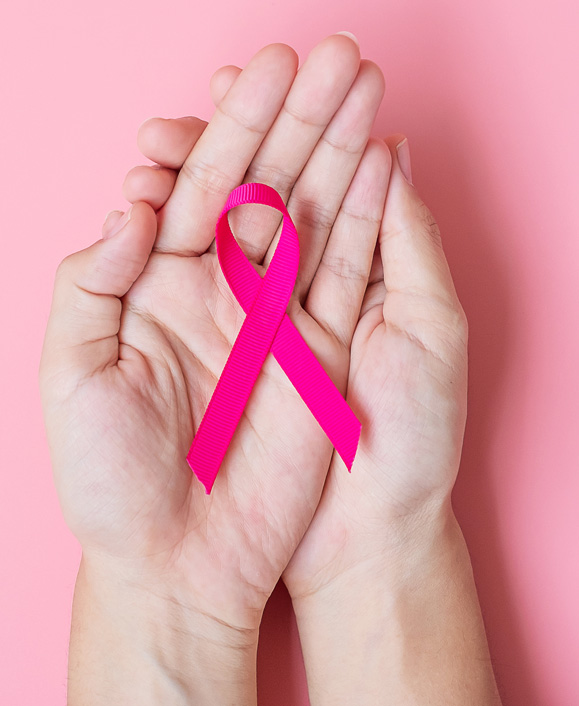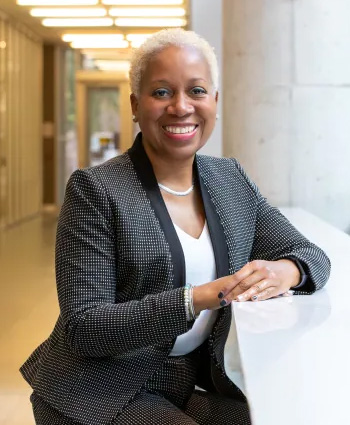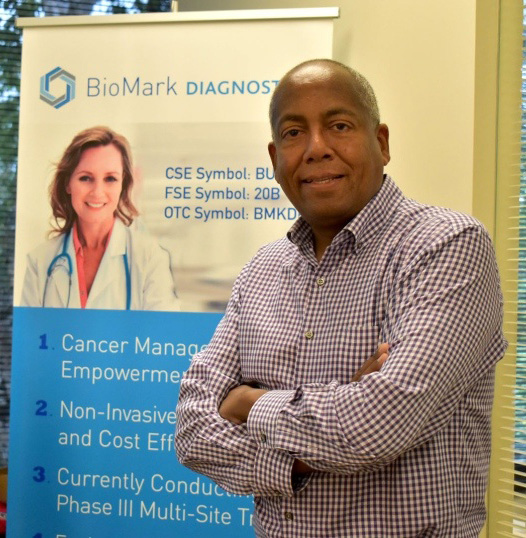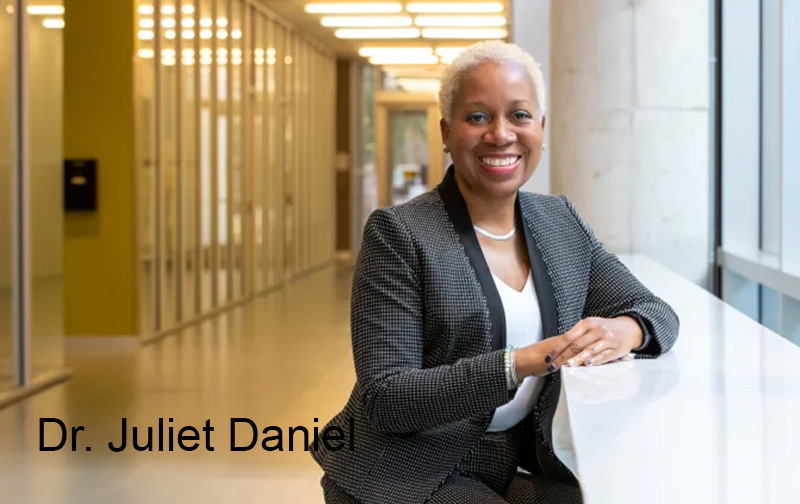Revolutionizing Cancer Research: Meet Dr. Juliet Daniel, the Trailblazing Black Scientist Making a Difference in the Lives of Triple Negative Breast Cancer (TNBC) Patients
Written by Tom Raycove, CEO Disrupted Logic Interactive Inc.
Celebrating Black History Month, we shine a spotlight on Dr. Juliet Daniel, a trailblazer in the field of cancer research. Driven by her own experiences with the disease, Dr. Daniel has dedicated herself to making a difference in the lives of those affected by cancer. She lost her mother and other loved ones to the disease, and as a breast cancer survivor, she knows the impact of cancer all too well.
BioMark Diagnostics salutes the great contribution of Dr. Juliet Daniel and would like to salute her work in breast cancer research.
Breast Cancer and Survival

Breast cancer is a disease that affects millions of women around the world and is the second most common form of cancer among women. While progress has been made in improving early detection and treatment, breast cancer still poses a significant threat to women’s health and well-being.
Survival rates for breast cancer have improved over the years, but disparities still exist in terms of access to care, treatment outcomes, and overall survival.
Black women, in particular, face a higher risk of developing breast cancer and are more likely to be diagnosed at later stages of the disease, leading to lower survival rates.
The impact of breast cancer on Black women cannot be overstated. In addition to the physical and emotional toll of the disease, Black women also face structural barriers that can prevent them from accessing quality healthcare and treatment. This includes factors such as poverty, lack of insurance, and systemic racism within the healthcare system. These challenges contribute to disparities in survival rates and the need for continued research and advocacy to address these inequities.
Research has shown that Black women are more likely to develop more aggressive forms of breast cancer, such as TNBC, and are also more likely to experience higher levels of stress, which can negatively impact their overall health and breast cancer outcomes. It is therefore critical that research continues to focus on understanding and addressing the unique challenges faced by Black women in the fight against breast cancer.
As a breast cancer survivor and researcher, Dr. Juliet Daniel has been at the forefront of efforts to better understand and address the impact of breast cancer on Black women. Through her work, she is helping to raise awareness of the need for increased support and resources for Black women affected by breast cancer and working to ensure that all women have access to the care and treatment they need to beat this disease.

"My journey has given me a unique perspective on the challenges faced by cancer patients," says Dr. Daniel. "Being a survivor has made me a stronger advocate for cancer patients and a more empathetic researcher."
Dr. Juliet Daniel Tweet
For the past decade, Dr. Daniel has focused her research on triple negative breast cancer (TNBC), an aggressive form of the disease that disproportionately affects women of African and Hispanic descent.
Triple Negative Breast Cancer
Triple negative breast cancer (TNBC) is a type of breast cancer that lacks expression of the three most common receptors known to fuel the growth of breast cancer cells: estrogen, progesterone, and HER2. This makes TNBC a more aggressive and difficult-to-treat form of breast cancer. It is also more common in women of African and Hispanic descent, a fact that has motivated researchers like Dr. Juliet Daniel to delve deeper into the biology behind these disparities.
Dr. Daniel has dedicated the last decade of her research to better understanding TNBC, with the goal of improving outcomes for patients. Through her work, she has uncovered important insights into the underlying biology of the disease and its impact on different populations. Her research has helped broaden the scientific community’s understanding of health inequities and has the potential to change the lives of Black and Hispanic women affected by TNBC.
Help Us Celebrate Black History Month By Sharing This Incredible Story
Diversity and Inclusion
In addition to her research, Dr. Daniel is a tireless advocate for diversity and inclusion in the field of science. As a member of the President’s Advisory Committee for Building an Inclusive Community at McMaster University and co-founder of the Canadian Black Scientists Network, she is dedicated to supporting and advancing the careers of Black Canadians in STEMM.

Diversity and inclusion in science and medicine is a crucial issue, especially when it comes to addressing health inequities in Canada. Black and Indigenous peoples have historically been underrepresented and marginalized within these industries, and there is a pressing need to increase representation and address systemic barriers that prevent these communities from participating fully.
Black History Month provides an opportunity to reflect on the contributions of Black Canadians to the scientific and medical fields and to acknowledge the ongoing need to support Black and Indigenous peoples in these industries. Despite facing systemic barriers and limited representation, Black and Indigenous peoples have made valuable contributions to our understanding of health and disease.
In Canada, initiatives such as the Canadian Black Scientists Network, co-founded by Dr. Juliet Daniel, aim to increase representation and support for Black Canadians in science, technology, engineering, mathematics, and medicine (STEMM). These efforts help to address the systemic barriers that prevent Black and Indigenous peoples from pursuing careers in STEMM and ensure that their voices and perspectives are included in discussions around health and disease.
Similarly, organizations like the President’s Advisory Committee for Building an Inclusive Community (PACBIC) at McMaster University, where Dr. Daniel is a long-standing member, work to increase diversity, equity, and inclusion in the academic and medical communities. These efforts aim to ensure that all communities, including Black and Indigenous peoples, have access to the resources and opportunities they need to succeed in their careers and contribute to the advancement of science and medicine.
Final Thoughts
Dr. Daniel is encouraged by the young people who are leading the charge for change in the research community. “The next generation of cancer researchers is poised to make a real difference, breaking down systemic barriers and ultimately saving lives,” she says.
Dr. Juliet Daniel’s research and advocacy work serves as a shining example of the impact that Black and Indigenous peoples can have in the scientific and medical fields. Her focus on triple negative breast cancer and its disproportionate impact on Black and Hispanic women highlights the importance of including diverse perspectives in the fight against disease.
Through her research and her leadership in initiatives like the Canadian Black Scientists Network and the President’s Advisory Committee for Building an Inclusive Community, Dr. Daniel is helping to increase representation and support for Black and Indigenous peoples in science, technology, engineering, mathematics, and medicine.
Dr. Daniel’s work highlights the importance of addressing health inequities and promoting diversity and inclusion in the scientific and medical industries and serves as a reminder of the critical role that Black and Indigenous peoples play in advancing our understanding of health and disease.
Rashid Ahmed, CEO of BioMark Diagnostics says, “ I as as a black man in science and medicine understand adversity and the importance of grit. Black History Month is a celebration of black people’s achievements, including in science and medicine. We at BioMark honor Dr. Juliet Daniel’s accomplishments during Black History Month, recognizing the resilience, determination and perseverance of black people in the face of challenges.

They serve as a reminder to pursue our passions regardless of race or gender”.
About BioMark Diagnostics Inc.
BioMark Diagnostics Inc. is a Canadian-based cancer diagnostic company with head office located in Richmond, British Columbia and operating lab in Quebec City, Quebec.
The company focuses on discovery and commercialization of novel biomarkers using metabolomics and incorporating machine learning algorithms. The main objective of the Company is to bring new diagnostics to the market and improve cancer prognosis by allowing physicians to detect carcinomas in the pre-symptomatic stages, when approximately 90% of cancers can be cured. BioMark’s robust technology platform can also be used for measuring a patient’s response to treatment and for the ongoing surveillance for cancer recurrence.
The Company’s initial focus is on early diagnosis for lung cancer using a dynamic panel of metabolites*, with plans to expand into other hard to detect and treat cancers such as brain, ovarian and pancreatic
Learn More
To learn more about black men and women in science and medicine, there are a number of resources available, including books, documentaries, and online resources. Some great places to start include the National Museum of African American History and Culture, the Association of Black Scientists and Engineers, and the National Association of Black Women in Science.




